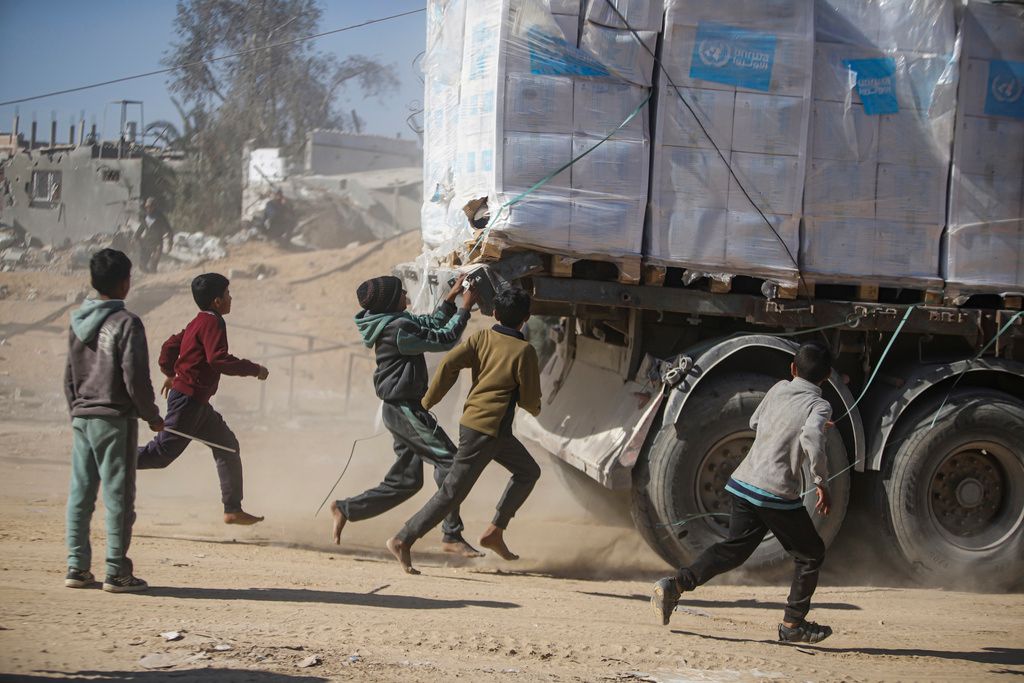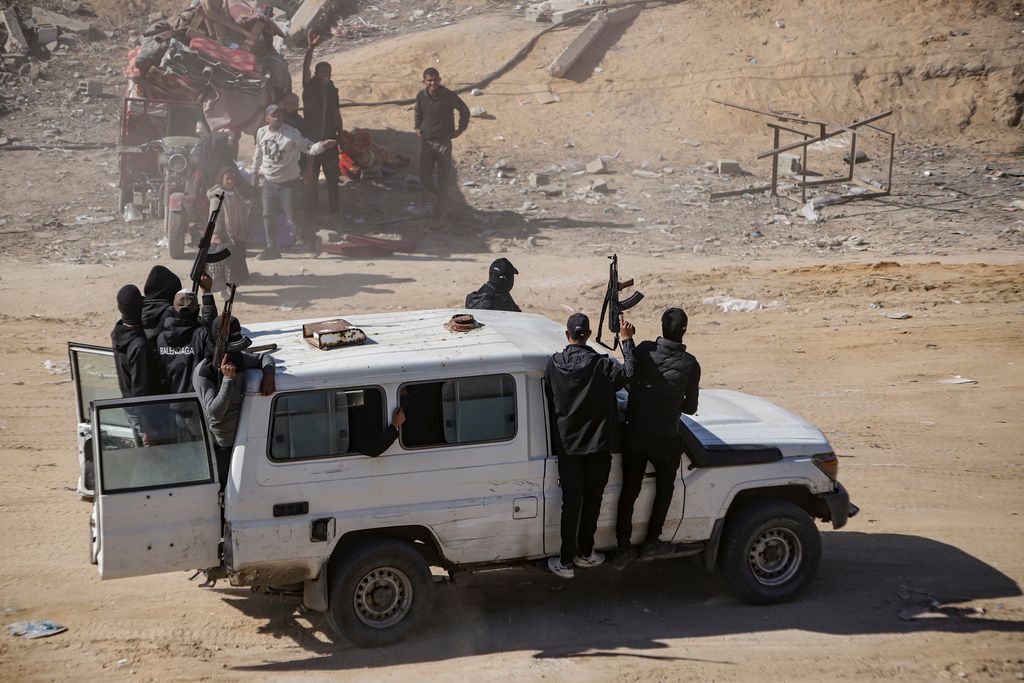
Palestinians chase humanitarian aid trucks that arrived through the Kerem Shalom crossing from Egypt into the Gaza Strip, in Rafah, Tuesday, Jan. 21, 2025. (AP Photo/Jehad Alshrafi)
Israel launched a major military operation Tuesday in the occupied West Bank city of Jenin that killed at least nine Palestinians and left at least 40 more people wounded, Palestinian health officials said, as Israel’s fragile ceasefire with Hamas in Gaza entered its third day.
In Tel Aviv, four people were wounded in a stabbing attack and the suspect was killed by security forces, according to Israeli police. Authorities only identified the attacker as a 28-year-old “foreign national” but believe the stabbings were a terrorist act.
Israel’s top general resigned Tuesday, taking responsibility for security failures tied to Hamas’ surprise attack in October 2023 that triggered the war in Gaza. The resignation adds to pressure on Prime Minister Benjamin Netanyahu, who has delayed any public inquiry that could potentially implicate his leadership.
Despite 15 months of war with Israel, Hamas remains firmly in control of Gaza. Many Palestinians in Gaza are now left picking through the rubble of their former homes amid a landscape of devastation.
Aid flowing smoothly into Gaza
The U.N. humanitarian coordinator in Gaza says trucks from the U.N., aid groups, governments and the private sector are arriving and no major looting has been reported – just a few minor incidents.
Nearly 900 trucks of aid entered Gaza on the third day of the ceasefire Tuesday, the United Nations said. That's significantly higher than the 600 trucks called for in the deal.
Muhannad Hadi, who returned to Jerusalem from Gaza on Tuesday afternoon, told U.N. reporters by video that it was one of the happiest days of his 35-year humanitarian career to see Palestinians in the streets looking ahead with hope, some heading home and some starting to clean up the roads.

Hamas fighters secure aid trucks that arrived the Gaza Strip, in Rafah, Tuesday, Jan. 21, 2025, days after a ceasefire deal between Hamas and Israel went into effect. (AP Photo/Jehad Alshrafi)
In his talks with families at a communal kitchen run by the U.N. World Food Program and elsewhere, he said, they all told him they need humanitarian assistance but want to go home, to work and earn money.
“They don’t like the fact that they have been depending on humanitarian aid,” Hadi said. Palestinians talked about resuming education for their children and about the need for shelter, blankets and new clothes for women who have been wearing the same clothes for more than a year. He said a shipment of tents is expected in the coming days.
Hadi, who is also the deputy U.N. coordinator for the Middle East peace process, said the U.N. hopes to start “early recovery” programs, beginning with cash-for-work removing the tons of rubble in Gaza. But he said the U.N. must make sure the banking system is operating and electricity is back, stressing the critical role of U.N. member states and the private sector in early recovery.
Hadi said lawlessness and looting happen in any war situation but with the ceasefire in Gaza the U.N. is hoping for a restoration of law and order, and he stressed that the minor incidents reported were not by organized criminals who looted U.N. convoys during the war.
Since the ceasefire, he said some kids jumped on some trucks trying to take a food basket, and some other people tried to take bottled water. “And hopefully, within a few days, this will all disappear once the people of Gaza realize that we will have aid, enough for everybody.”
Hadi said there are logistical challenges now, including trying to move trucks on roads which are destroyed and where people are also traveling.
“They know that their houses are destroyed,” he said. “But all of them simply told me that if I get a tent, I’ll go back there and I’ll live on top of the rubble in my place of origin.”
‘We found nothing’
Many Palestinians from the southern Gaza city of Rafah who returned to the area Tuesday were shocked to find nothing left of their homes and businesses.
Manal Selim, a single mother of six, worked as a hairdresser and owned a shop that rented wedding and evening dresses. Her family lived upstairs.
“We thought we’d find some place to live in or stay," she said. "The destruction is scary. It’s like an apocalypse.”
She broke down in tears seeing it all destroyed, pulling a few ripped dresses from under the rubble.
“This is my house. I built it brick by brick for 25 years,” she said.
Elsewhere, Murad Miqdad found his home and electric appliance store in a three-story building completed destroyed.
“We found nothing," he said. "There's nothing to pull out of the house, and if you were able to pull anything out, you still wouldn't be able to use it.”